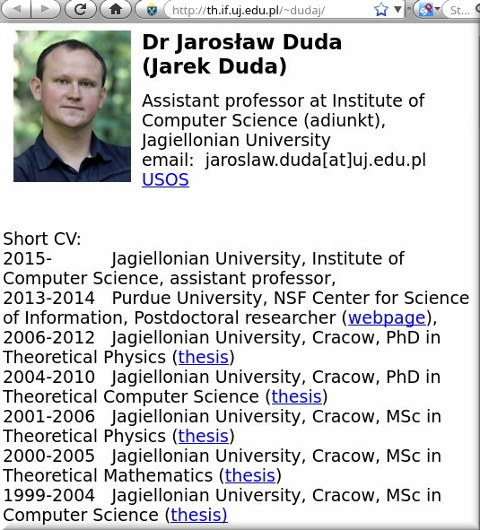

Source: Jarek Duda's homepage
"The Supreme Court no doubt 'upsets' the status quo and pisses off the patent maximalists, but that's just the law."The term "AI" comes from CNN, which has just published "Uber wants to patent a way to use AI to identify drunk passengers" (AOL went with another kind of headline). Still just a patent application, CNN says that "[t]he patent application describes a system that learns how you typically use the Uber app, so that it can identify unusual behavior. The system relies on an algorithm to weigh a variety of factors, including typos, how precisely a user clicks on links and buttons, walking speed, and how long it takes to request a ride. The time of day, and where a ride is requested may also be considered."
Of course this should be rejected. The Supreme Court no doubt 'upsets' the status quo and pisses off the patent maximalists, but that's just the law. Robert Stoll, a former Commissioner for Patents at the USPTO, now admits (implicitly) that software patents are pretty much 'dead' in the US and trade secrets should be pursued instead. Have such patents outlived their usefulness? His summary at Watchtroll says: "Innovative algorithms and even diagnostic methods may be easier and more effectively protected by trade secret. Trade secret protection avoids the uncertainty of compliance with the vague patentability standard set forth by the Supreme Court."
Coming from a patent maximalist like Stoll, this is pretty significant. These people have seemingly given up. Almost.
It is good to see that EFF staff is nowadays speaking explicitly about "software patents" rather than just "bad patents" (or equally vague terms). Mr. Nazer has just noted: "In an important sense, this is the story of just about every software patent. Almost all of them take the form: Use [existing hardware] and [known software methods and techniques] to get a [fairly unexceptional result]. [...] When IBM is getting 9,000 freaking patents every year, and Google and Microsoft are getting 2,500 each, they are filing applications for every trivial little thing they do."
Well, IBM acts like a patent troll and Microsoft keeps feeding patent trolls whilst also using software patents to blackmail GNU/Linux companies (an extortion racket). Google being mentioned there is noteworthy and we'll explain why in just a moment.
Historically we have been relatively sympathetic towards Linux-powered products such as Android. We openly supported these products knowing that these had been subjected to Microsoft's blackmail. This had an impact on both GNU and Linux (and beyond).
Some hours ago, in writing about Space Data Corporation v Alphabet, Inc. and Google LLC, the Docket Navigator revealed that Google seemingly suspects that it is being sued by proxy (maybe by Microsoft). We say Microsoft because we already have extensive evidence that Microsoft does such things, e.g. the SCO lawsuit. Might a company like Microsoft be funding these lawsuits against Google and Android? We know for sure that Microsoft has been feeding patents into the mouths of patent trolls which go after Android OEMs. "The court denied defendants' motion to compel additional discovery regarding plaintiff's litigation funding because defendants failed to establish relevance or proportionality," says the Docket Report. Who does Google suspect to be the financier of Space Data Corporation's litigation campaign? We don't know. But does Google deserve full sympathy? Well, not anymore.
The EFF's Daniel Nazer mentioned the situation we covered earlier this week. He wrote that "Google’s ANS patent only stands out because the real inventor of ANS took every step he could to ensure that the new compression algorithm would truly belong to the public."
"And he also approached the media," I told Nazer, "myself included..."
Nazer highlighted "Google’s response: “but we are applying the technique to video” might not impress a talented computer scientist like Jarek Duda. But arguments like that prevail at the USPTO all the time."
The USTPO profits from issuing lots of bogus patents that courts would invalidate later (if the defendant/IPR filer can afford it). This really ought to stop. Google itself ought to stop as well. TechDirt has just published a complaint about this as well, including this preceding background:
For the most part, Google has actually been one of the good guys on patent issues. Unlike some other Silicon Valley companies, Google has long resisted using its patents to go after others, instead only using the patents defensively. It has also fought for patent reform and experimented with new models to keep its own patents out of the hands of patent trolls. But it's been involved in an ongoing fight to patent something that an earlier inventor deliberately released into the public domain, and it reflects incredibly poorly on Google to keep fighting for this.
A Polish professor, Jarek Duda, came up with a new compression technique known as asymmetric numeral systems (ANS) years back, and decided to release it to the public domain, rather than lock it up. ANS has turned out to be rather important, and lots of companies have made use of it. Last summer, Duda noticed that Google appeared to be trying to patent the idea both in the US and around the globe.
Tragically, this happened just weeks after Duda had called out other attempts to patent parts of ANS, and specifically said he hoped that companies "like Google" would stand up and fight against such attempts. Three weeks later he became aware of Google's initial patent attempt and noted "now I understand why there was no feedback" on his request to have companies like Google fight back against attempts to patent ANS. In that same thread, he details how there is nothing new in that patent, and calls it "completely ridiculous." Despite noting that he can't afford to hire a patent lawyer, he's been trying to get patent offices to reject this patent, wasting a bunch of time and effort.